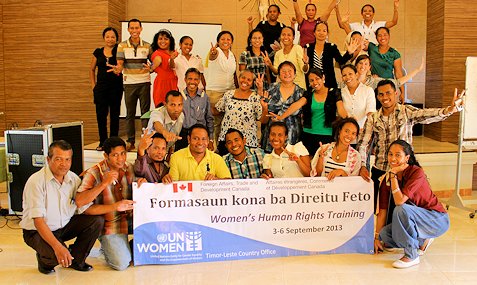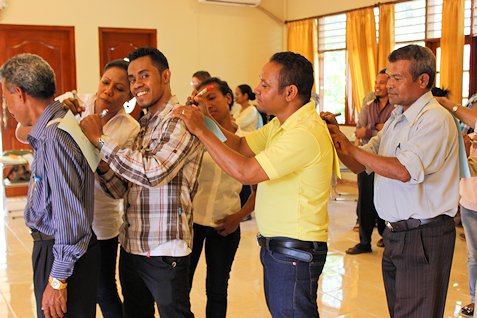Using women’s human rights as a means to an end
Date:
“In our campaign to talk to people about women’s human rights in decentralization, we would make sure to get the word to the rural areas. We would do a talk show and put it on community radio, TVTL [public access TV station], and do training sessions in remote areas where people don’t have TV or radio,” said Luisa R. Marcal, a programme coordinator for Pradet, a local NGO that supports survivor services. Luisa attended a week-long training on women’s human rights, organized and facilitated by UN Women and supported by Foreign Affairs, Trade and Development Canada. The purpose of the training was to enable participants from civil society, the justice sector, religious leaders and government representatives to understand the direct links between women’s human rights, discrimination and gender equality, and to strengthen knowledge of the Convention on the Elimination of All Forms of Discrimination Against Women (CEDAW) to bring about positive changes at the legislative and community level to protect and fulfil women’s human rights.

This is a particularly important time for women in Timor-Leste. Though CEDAW was ratified in April of 2003 barring discrimination, women still face multiple forms of discrimination on a daily basis at work, in the home and in the community. The workshop covered key concepts such as the state’s obligation to women in terms of upholding the principles of CEDAW, feminism and human rights, as well as ways to apply women’s human rights perspectives to the work of the government, CSOs, religious leaders and community members.
Incorporating women in decentralization
Throughout the last two days of the training, UN Women partners and members of civil society organizations focused their discussions on decentralization. The government of Timor-Leste is about to embark on a process of decentralization. Decentralization has been put forward as one possible way to reduce poverty, and it is a relatively new concept for this 11-year-old country. Parliamentarians and other members of the government are holding consultations in districts to get input about the specific needs of citizens.
As the discussion and analysis of decentralization advanced, participants spilt into four smaller groups, focusing on research, drafting of laws and awareness raising, to explore the various ways in which to incorporate women’s human rights into the decentralization process. The groups came up with ideas such as targeting women in the election/nomination processes of district representatives and setting quotas for women representatives at 50 per cent in the legislation. Renowned women’s human rights trainer and feminist lawyer, Honey Tan, kept the debate going by asking provocative questions such as, “yes, a 50 per cent target is a good idea, but how will you prevent them from serving coffee and tea instead of making decisions?”
Government and church involvement
Timor-Leste, a country where 90 per cent of people profess a Catholic faith, civil society and the church have a long history of working collaboratively to support communities and provide help to those in need. Mother Maria Imaculada da Conceição da Silva of the Carmelite Sisters, one of the participants in the UN Women training, commented on the past week’s experience, saying, “This training was good for us because it looked not only at women’s human rights but also at gender equality. Equality should not only happen in the workplace but in the community as well. Many of our Sisters work in communities and with families, so this is important information for us.” Mother Maria further discussed the importance of bringing the attention of communities to anti-discriminatory measures and violence reduction in general.

Nelson Antonio, the Gender-based Violence focal point for the Ministry of Social Solidarity, also expressed his enthusiasm at the close of the training: “There are strong links between discrimination, women’s human rights and gender-based violence. I had never really thought about it before, but discriminating against women often leads to violence against women. I can raise this issue back at the Ministry and talk to my colleagues about how we can all work to end discrimination against women as a means of reducing gender-based violence.”
This programme was made possible by
